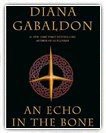Outlander aka Cross Stitch - Gabaldon Diana (читать книгу онлайн бесплатно полностью без регистрации .TXT) 📗
I gripped my bag again; this time to keep from striking him.
He shook his head again, plump chest rising and falling with his labored breathing. “No, if you were an immediate member of his family, perhaps…” He looked up, blinking. I clamped my jaw tightly, determined to give nothing away. Surely a slight show of agitation was reasonable, under the circumstances.
“But perhaps, my dear…” He seemed struck by sudden inspiration. He got ponderously to his feet and went to an inner door, where a uniformed soldier stood on guard. He murmured to the man, who nodded once and vanished.
Sir Fletcher came back to his desk, pausing on the way to retrieve a decanter and glasses from the top of a cabinet. I accepted his offer of claret; I needed it.
We were both halfway through the second glass by the time the guard returned. He marched in without invitation, placed a wooden box on the desk at Sir Fletcher’s elbow, and turned to march out again. I caught his eye lingering on me and modestly lowered my own gaze. I was wearing a gown borrowed from a lady of Rupert’s acquaintance in the nearby town, and from the scent that saturated the dress and its matching reticule, I had a reasonably good idea just what this particular lady’s profession was. I hoped the guard didn’t recognize the gown.
Draining his cup, Sir Fletcher set it down and pulled the box toward him. It was a plain, square box of unfinished wood, with a sliding lid. There were letters chalked on the lid. I could read them, even upside down. FRAYSER, they read.
Sir Fletcher slid back the lid, peered inside for a moment, then closed the box and pushed it toward me.
“The prisoner’s personal effects,” he explained. “Customarily, we send them to whomever the prisoner designates as next of kin, after execution. This man, though” – he shook his head – “has refused altogether to say anything about his family. Some estrangement, no doubt. Not unusual, of course, but regrettable under the circumstances. I hesitate to make the request, Mrs. Beauchamp, but I thought that perhaps, since you are acquainted with the family, you would consider taking it upon yourself to convey his effects to the appropriate person?”
I didn’t trust myself to speak, but nodded and buried my nose in my cup of claret.
Sir Fletcher seemed relieved, whether at disposing of the box, or at the thought of my imminent departure. He sat back, wheezing slightly, and smiled expansively at me.
“That is very kind of you, Mrs. Beauchamp. I know such a thing cannot but be a painful duty to a young woman of feeling, and I am most sensible of your kindness in undertaking it, I do assure you.”
“N-not at all,” I stammered. I managed to stand up, and to gather up the box. It measured about eight inches by six, and was four or five inches deep. A small, light box, to hold the remains of a man’s life.
I knew the things it held. Three fishing lines, neatly coiled; a cork stuck with fishhooks; a flint and steel; a small piece of broken glass, edges blunt with wear; various small stones that looked interesting or had a good feel between the fingers; a dried mole’s foot, carried as a charm against rheumatism. A Bible – or perhaps they had let him keep that? I hoped so. A ruby ring, if it hadn’t been stolen. And a small wooden snake, carved of cherry wood, with the name SAWNY scratched on its underside.
I paused at the door, gripping the frame with my fingers to steady myself.
Sir Fletcher, following courteously to see me out, was at my side in a moment.
“Mrs. Beauchamp! Are you feeling faint, my dear? Guard, a chair!”
I could feel the prickles of a cold sweat breaking out along the sides of my face, but I managed to smile and wave away the proffered chair. I wanted more than anything to get out of there – I needed fresh air, in large quantities. And I needed to be alone to cry.
“No, I’m quite all right,” I said, trying to sound convincing. “It’s only… a bit close in here, perhaps. No, I shall be perfectly all right. My groom is waiting outside, in any case.”
Forcing myself to stand up straight and smile, I had a thought. It might not help, but it couldn’t hurt.
“Oh, Sir Fletcher…”
Still worried by my appearance, he was all gallantry and attention.
“Yes, my dear?”
“It occurred to me… How sad for a young man in this situation to be estranged from his family. I thought perhaps… if he wished to write to them – a letter of reconciliation, perhaps? I would be pleased to deliver it to – to his mother.”
“You are thoughtfulness itself, my dear.” Sir Fletcher was jovial, now that it seemed I was not going to collapse on his carpet after all. “Of course. I will inquire. Where are you staying, my dear? If there is a letter, I shall have it sent to you.”
“Well,” I was doing better with the smile, though it felt pasted on my face. “That is rather uncertain at the moment. I have several relatives and close acquaintances in the town, with whom I fear I shall be obliged to stay in turn, in order to avoid offending anyone, you see.” I managed a small laugh.
“So if it does not disturb you too much, perhaps my groom could call to inquire for the letter?”
“Of course, of course. That will do excellently, my dear. Excellently!”
And with a quick glance back at his decanter, he took my arm to escort me to the gate.
“Better, lassie?” Rupert pushed back the curtain of my hair to peer at my face. “Ye look like an ill-cured pork belly. Here, better have a bit more.”
I shook my head at the proffered whisky flask and sat up, wiping the damp rag he had brought across my face.
“No, I’m all right now.” Escorted by Murtagh, who was disguised as my groom, I had barely made it out of sight of the prison before sliding off my horse and being sick in the snow. There I remained, weeping, with Jamie’s box clutched to my bosom, until Murtagh had gathered me up bodily, forced me to mount, and led me to the small inn in Wentworth town where Rupert had found lodgings. We were in an upper room, from which the bulk of the prison was barely visible in the gathering dusk.
“Is the lad dead then?” Rupert’s broad face, half-obscured by his beard, was grave and kind, lacking any of its usual clowning.
I shook my head and took a deep breath. “Not yet.”
After hearing my story, Rupert paced slowly around the room, pushing his lips in and out as he thought. Murtagh sat still, as usual, no sign of agitation on his features. He would have made a wonderful poker player, I thought.
Rupert returned, sinking down on the bed beside me with a sigh.
“Weel, he’s alive still, and that’s the most important thing. Damned if I see what to do next, though. We’ve no way to get into the place.”
“Aye, we have,” Murtagh said, suddenly. “Thanks to the wee lassie’s thought about the letter.”
“Mmmphm. One man, though. And only so far as the governor’s office. But aye, it’s a start.” Rupert drew his dirk and idly scratched his thick beard with the point. “It’s a damn big place to search.”
“I know where he is,” I said, feeling better with the planning, and the knowledge that my companions weren’t giving up, no matter how hopeless our enterprise seemed. “At least I know which wing he’s in.”
“Do ye, then? Hmm.” He replaced the dirk and resumed his pacing, stopping to demand, “How much money have ye, lass?”
I fumbled in the pocket of my gown. I had Dougal’s purse, the money Jenny had forced me to take, and my string of pearls. Rupert rejected the pearls, but took the purse, pouring a stream of coins into the palm of one capacious hand.
“That’ll do,” he said, jingling them experimentally. He cocked an eye at the Coulter twins. “You twa laddies and Willie – come wi’ me. John and Murtagh can stay here wi’ the lassie.”
“Where are you going?” I asked.
He poured the coins into his sporran, keeping back one, which he tossed meditatively in the air.



